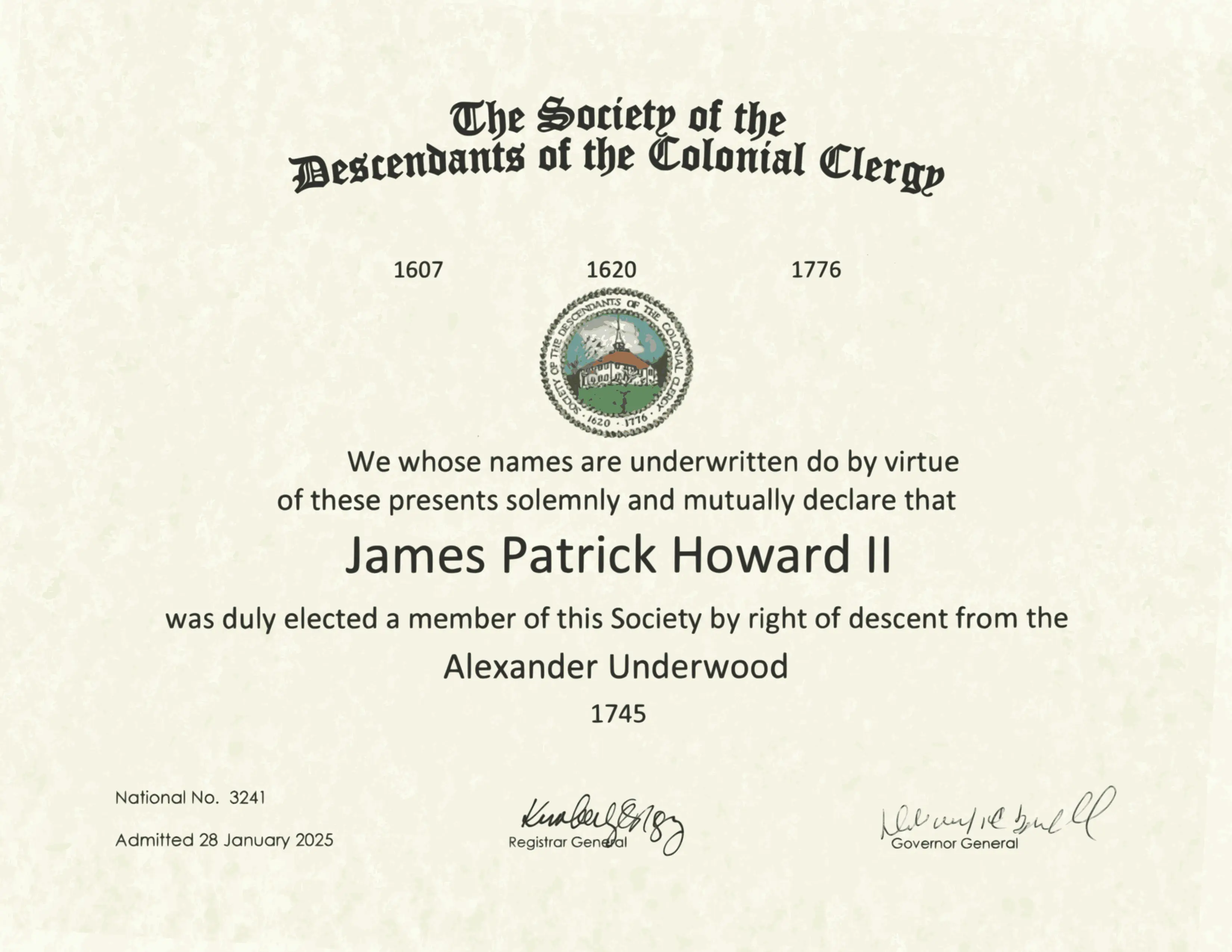Society of the Descendants of the Colonial Clergy

Member jure Rev. Alexander Underwood (1688–1767); member no. 3241

Member jure Rev. Alexander Underwood (1688–1767); member no. 3241
The Society of the Descendants of the Colonial Clergy is a hereditary organization dedicated to honoring and preserving the legacy of the ministers and religious leaders who played a pivotal role in colonial American society. Founded in 1933, the Society fosters research into early American religious history and provides a network for descendants of colonial clergy.
Rev. Alexander Underwood (1688–1767) was a prominent Quaker minister and a dedicated spiritual leader who played a significant role in shaping the early Quaker community in Pennsylvania. His deep commitment to faith and religious service was evident in his extensive travels, leadership roles, and active participation in the expansion of Quakerism.
Born in Baltimore, Maryland, to Samuel Underwood and Mary Wilcocks, Alexander Underwood grew up in an era of intense religious and social transformation. The early 18th century saw a flourishing of Quakerism, particularly in the American colonies, where its principles of pacifism, egalitarianism, and spiritual introspection gained traction among settlers seeking religious freedom. Underwood’s family, deeply immersed in this movement, provided an environment that nurtured his unwavering faith and sense of purpose.
In 1710, Underwood married Jane Harris in New Castle, Delaware. Their union was one of both spiritual and familial significance, as their children would go on to become key figures in the expansion of Quaker ideals across Pennsylvania and beyond. His role as a husband and father was deeply intertwined with his religious commitments, ensuring that his household was one of faith, discipline, and devotion to Quaker principles.
By 1722, Alexander had established himself in London Grove Township, Chester County, Pennsylvania, a region that had become a hub for Quaker settlers. His natural leadership and strong moral character quickly made him an integral part of the local Friends Meeting. His dedication was formally recognized on November 31, 1735, when he was appointed as an Elder, an esteemed position that carried significant responsibility. In this role, he was entrusted with overseeing the spiritual development of the congregation, maintaining adherence to Quaker testimonies, and serving as a mediator in disputes, ensuring that community life aligned with Quaker ethics.
Underwood’s ministry extended far beyond the boundaries of Pennsylvania. He embarked on at least two extensive missionary journeys to North Carolina, traversing difficult terrain to visit and support Friends Meetings throughout the region. His presence provided much-needed guidance to fledgling Quaker communities, reinforcing their commitment to pacifism, integrity, and mutual aid. These travels were not without hardship, as long journeys on horseback and exposure to the elements tested his endurance. Nevertheless, his perseverance helped cement the Quaker presence in North Carolina, ensuring that the faith continued to spread and thrive.
Beyond his spiritual duties, Underwood also played a pivotal role in the practical aspects of community-building. He facilitated the establishment of meetinghouses, encouraged literacy and education among fellow Quakers, and worked tirelessly to maintain peaceful relations with neighboring communities. His ability to bridge theological conviction with practical leadership solidified his reputation as one of the most respected Quaker ministers of his time.
His influence, both in Pennsylvania and North Carolina, was instrumental in shaping the early American Quaker movement. He left behind not only a strong family legacy but also a spiritual one that would endure for generations, ensuring that the Quaker values of simplicity, truth, and peace remained central to the communities he served.
In 1742, Rev. Underwood relocated to Warrington, York County, Pennsylvania, where he continued to serve as a spiritual mentor and community leader. His influence extended beyond the walls of the meetinghouse, as he actively participated in land transactions, community disputes, and governance within the Quaker society. His deep commitment to the faith was unwavering, even after the passing of his first wife, Jane. In 1748, he remarried Sarah Bowater Beals, a Quaker widow with her own extensive family ties to the movement. Together, they worked tirelessly to strengthen the spiritual and communal bonds of the Friends Meetings, ensuring the continued growth and integrity of the Quaker faith in the region.
Rev. Underwood’s later years were marked by sustained religious devotion and an ever-expanding family network. As an Elder, he played a key role in overseeing the discipline of the congregation, settling theological matters, and maintaining the Quaker testimonies of peace and integrity. He also frequently hosted visiting ministers and played an instrumental role in fostering ties between Quaker communities in Pennsylvania and beyond. He passed away on October 31, 1767, leaving behind a profound legacy of faith, service, and leadership. His will, dated May 28, 1767, meticulously provided for his children–John, Elihu, William, Samuel, Thomas, Joseph, and Benjamin–as well as his daughters Ruth Morthland, Mary Wells, Ann Fraizor, and Jane Smith. His burial at the Warrington Friends Meeting House Cemetery remains a lasting testament to his unwavering dedication to Quaker principles.
His legacy was formally acknowledged on May 7, 1768, when the Quaker community approved an official eulogy recognizing his lifelong commitment to ministry. This eulogy highlighted his leadership, missionary efforts, and the indispensable role he played in sustaining the Quaker movement during a time of expansion and change. To this day, his contributions to Quakerism in Pennsylvania and North Carolina continue to be studied and honored by historians and genealogists. His life serves as an enduring example of spiritual fortitude, dedication to community, and steadfast adherence to the principles of the Religious Society of Friends.
Through my descent from Rev. Alexander Underwood, I am honored to be a member of the Society of the Descendants of the Colonial Clergy, recognizing his legacy in shaping early American religious life. The Society remains committed to preserving the history of colonial ministers and their vital role in establishing the spiritual and cultural foundations of the American colonies.
Additional memberships will be added as they are approved.

Or you can download the PDF here.